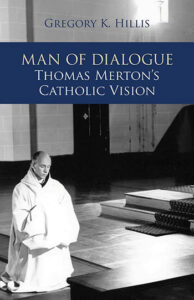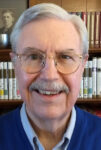By Tim Walch
 A Review of “Man of Dialogue: Thomas Merton’s Catholic Vision” by Gregory K. Hillis. Liturgical Press, 2021. 297 pp., $24.95.
A Review of “Man of Dialogue: Thomas Merton’s Catholic Vision” by Gregory K. Hillis. Liturgical Press, 2021. 297 pp., $24.95.
More than 50 years after his death in 1968, Thomas Merton — a monk, writer and social activist — continues to generate controversy. Many Catholics admire Merton for his deeply personal religious thought, for his dialogue with Eastern religions and for his commitment to social and racial justice.
But not all Catholics agree. In fact, more than a few critics have questioned Merton’s faithfulness to Catholic doctrine. Conservatives point to the ambition, pride, hubris and hypocrisy found in many of his letters and journal entries. They also whisper about Merton’s brief romance with a young nurse in 1966.
So how are we to assess this complex man? A new book by Gregory Hillis helps us navigate Merton’s life and legacy. A professor of theology and a lifelong Merton scholar, Hillis offers a practical way to reconsider Merton.
He begins with a surprising endorsement — a quote from Pope Francis to the U.S. Congress in 2015: “Merton was, above all, a man of prayer, a thinker who challenged the certitude of his time and opened new horizons for souls and for the Church. He also was a man of dialogue, a promotor of peace between people and religions.” That’s a good place to start.
The book follows a topical framework with separate chapters on Merton as a convert, priest, novice master, Marianist, advocate for peace and social justice, lover,

dialogist and pilgrim of the East. He begins and ends with parallel chapters on Merton’s devotion to Catholicism. Of particular value are the quotes from Merton’s writings, letters and journals.
Dialogue is the common theme in each chapter. At his core, Merton was a seeker, a thinker on a lifelong quest to learn from a wide variety of individuals and philosophies. He believed that this quest fully enriched his understanding of Christianity in general and Catholicism in particular.
Hillis underscores that Merton was an apostle of affirmation who found peace through dialogue. In a circular letter late in life, Merton reflected on the value he found in diversity. “I wish you all the peace and joy in the Lord and an increase in faith” he wrote, “for in my contacts with these new friends I also feel consolation in my own faith in Christ and His indwelling presence. I hope and believe He may be present in the hearts of all of us.”
Merton’s ecumenicism and search for common ground came at a price. A steady flow of essays and books on controversial issues fueled accusations that Merton was not sufficiently Catholic.
Some suggested that Merton was leaving the Church for Buddhism.
“Far from compromising him as a Roman Catholic,” writes Hillis, “Merton’s clarion call to dialogue was rooted in his Catholicism, and specifically in his understanding of the unifying nature of the Eucharist, the sacrament of love. He did not understand dialogue to mean capitulating to the world but understood it to be opposed to the logic of a world bent on perpetual enmity and fragmentation.”
How Catholic was Thomas Merton? Gregory Hillis guides us in contemplating the many facets of that question. The answer is intertwined in a prayer from Merton’s 1956 book “Thoughts in Solitude.”
“My Lord God,” Merton wrote, “I have no idea where I am going. I do not see the road ahead of me. I cannot know for certain where it will end, nor do I really know myself, and the fact that I think I am following your will does not mean I am actually doing so. But I believe that the desire to please you does in fact please you.”
He ends with a sentiment that should resonate with all of us: “I will not fear, for you are ever with me,” Merton wrote, “and you will never leave me to face my perils alone.”
Thomas Merton still speaks to us. Many Catholics embrace his message; others remain skeptical, even questioning his fidelity to the Church. The dialogue continues.
(Timothy Walch is a lay director at St. Thomas More Parish in Coralville and a member of The Catholic Messenger’s board of directors. He reviews books and writes opinion commentary for the Messenger and other publications.)











